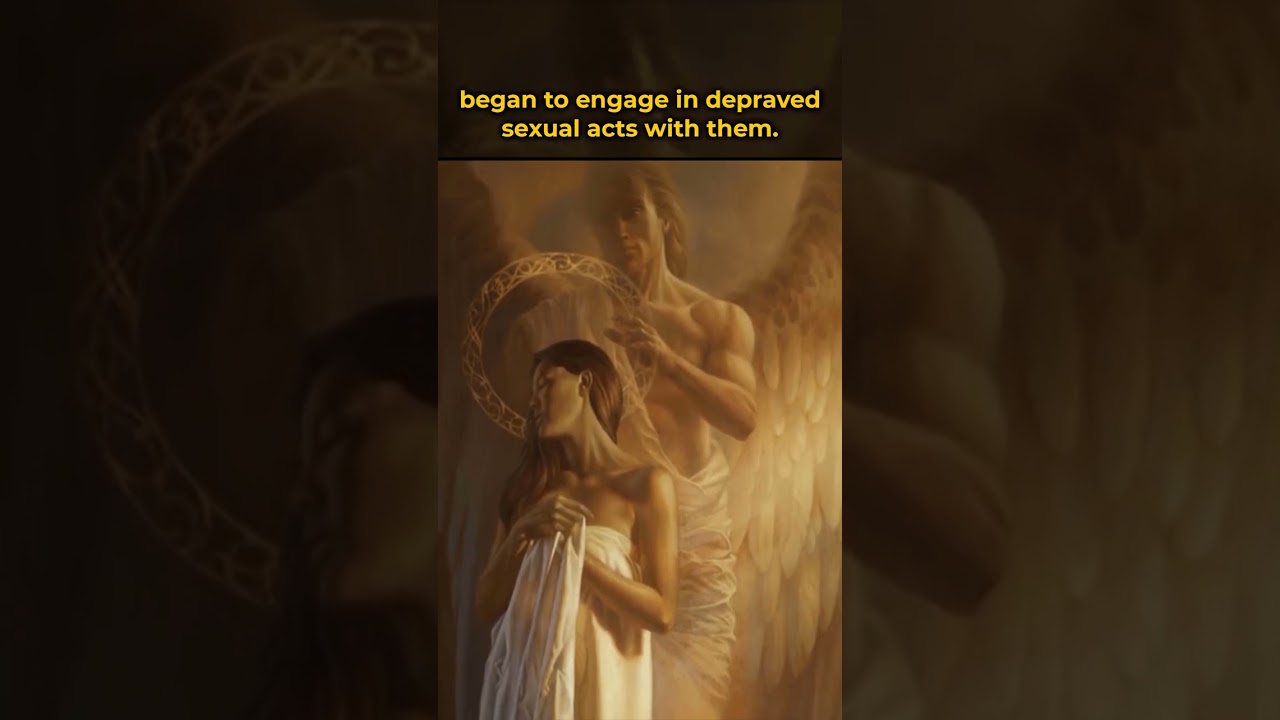Are you interested in uncovering a hidden piece of history that has been banned from the Bible? Look no further than “The Watchers: Fallen Angels and the Book of Enoch.” This intriguing video by Universe Inside You delves into the contents of The Book of Enoch, a collection of five books that provide a completely different account of the events leading up to the Great Flood of Noah’s time. The Book of Enoch tells the story of the Watchers, described as fallen angels sent to earth to watch over humans. However, instead of mere observation, these Watchers became infatuated with human women, leading to the birth of the Nephilim, supernatural giants that endangered humanity. Moreover, the video explores the imprisonment of the Watchers and the role of the patriarch Enoch as the intermediary between the gods and the Watchers. Prepare to be captivated by this alternative narrative of human history.
Introduction
The Book of Enoch is a fascinating and controversial text that was excluded from the Bible. It is composed of five books, each with its own unique content and insights into the history of humanity. This article will explore the composition, structure, and themes of the Book of Enoch, as well as delve into the captivating stories of the Watchers, the Fallen Angels, the Nephilim, and the events leading up to the Great Flood. We will also discuss the imprisonment of the Watchers, the controversy surrounding the exclusion of the Book of Enoch from the Bible, and its enduring influence on religious and esoteric traditions. By the end of this article, you will have a greater understanding of the true story of humanity as told in the Book of Enoch.
The Book of Enoch
Composition
The Book of Enoch is made up of five different books: the Book of Watchers, Book of Parables, The Astronomical Book, The Dream Visions, and The Epistles of Enoch, comprising a total of approximately 100 chapters. These books are attributed to Enoch, the seventh patriarch in the Book of Genesis, who was the father of Methuselah and the grandfather of Noah. The Book of Enoch provides a unique perspective on the events leading up to the Great Flood and offers a different doctrinal history compared to the biblical account.
Structure
Each book within the Book of Enoch contains distinct narratives and themes. The Book of Watchers introduces the concept of the Watchers, who are fallen angels sent to Earth to watch over humans. The Book of Parables focuses on Enoch’s prophetic visions, while The Astronomical Book explores Enoch’s celestial encounters and his understanding of the universe. The Dream Visions describes Enoch’s dreams and the messages he receives from God, and The Epistles of Enoch contains letters attributed to Enoch.
Themes
The Book of Enoch touches on various themes including the nature of the Watchers and their interactions with humans, the origin and characteristics of the Nephilim, and the role of Enoch as a mediator between gods and the imprisoned Watchers. These themes provide a unique perspective on the nature of evil, the consequences of disobedience, and the divine intervention in human affairs.

The Watchers
Nature of the Watchers
According to the Book of Enoch, the Watchers are fallen angels who were sent to Earth with the purpose of watching over humanity. However, these Watchers became infatuated with human women and engaged in immoral acts. Their disobedience led to their fall from grace and their descent into a state of wickedness.
Purpose of the Watchers
Initially, the Watchers were intended to be guides and guardians for humans, offering them wisdom and assistance. Their true purpose was to help humans navigate the challenges of life and maintain a harmonious relationship with the divine. However, their infatuation with human women led them astray from their original purpose.
Interactions with Humans
The Watchers’ interactions with humans were initially meant to be positive and beneficial. However, their actions devolved into depraved sexual acts with human women, resulting in the birth of the Nephilim. This interaction between fallen angels and humans had disastrous consequences for humanity, as it led to the corruption and destruction of society.
The Fallen Angels
Identification of Fallen Angels
In the Book of Enoch, fallen angels are identified as the Watchers who descended to Earth and became captivated by human women. These fallen angels are distinct from demons, as they were originally celestial beings tasked with watching over humanity.
Reason for their Fall
The fallen angels fell from grace due to their desire for human women, which diverted them from their original purpose. They chose to engage in immoral acts, disregarding the boundaries set for them by the divine. Their fall symbolizes the allure of temptation and the consequences of disobedience.
Consequences of their Fall
The fall of the Watchers resulted in the corruption of humanity and the birth of the Nephilim. These consequences had far-reaching effects, leading to societal decay, violence, and a departure from the divine plan for humanity. The Book of Enoch emphasizes the importance of obedience and warns against the dangers of succumbing to temptation.

The Events Leading up to the Great Flood
Enoch’s Role
Enoch, the seventh patriarch in the Book of Genesis, plays a crucial role in the events leading up to the Great Flood. As a righteous man, he was chosen by God to be a messenger and mediator between the gods and the imprisoned Watchers. Enoch’s obedience and righteousness set him apart and made him instrumental in delivering God’s judgment.
The Wickedness of the Nephilim
The Nephilim, born from the union of the Watchers and human women, were described as giants and savages. Their wickedness endangered and pillaged humanity, causing great suffering and distress. Their actions played a significant role in the divine decision to bring about the Great Flood as a means to cleanse the earth.
God’s Judgment
In response to the corruption and wickedness brought about by the Watchers and the Nephilim, God decided to bring about the Great Flood to cleanse the earth. Enoch, through his righteous actions and obedience, served as a conduit for God’s judgment. The flood represented both punishment and an opportunity for renewal and restoration.
The Nephilim
Origin of the Nephilim
The Nephilim were the offspring of the Watchers and human women. Their existence was a result of the fallen angels’ disobedience and their descent into immorality. The interbreeding between celestial beings and humans gave rise to a race of supernatural, man-eating giants.
Characteristics and Actions
The Nephilim were described as giants, possessing immense physical strength and stature. They were savage beings that caused havoc and destruction wherever they went. Their actions endangered humanity and led to the downfall of civilizations, further illustrating the disastrous consequences of the Watchers’ disobedience.
Implications for Humanity
The existence of the Nephilim showcases the consequences of disobeying divine commandments and engaging in immoral behavior. It serves as a warning to humanity about the dangers of succumbing to temptation and deviating from the path set by the divine. The Nephilim’s presence before the Great Flood highlights the need for redemption and the importance of choosing righteousness.

The Imprisonment of the Watchers
Enoch’s Mission
Enoch, as a righteous and favored individual, was entrusted with the important mission of mediating between the gods and the imprisoned Watchers. His role was to convey God’s judgment and deliver messages to the fallen angels. Enoch became the bridge between the divine realm and the Watchers confined in their subterranean prison.
Punishment of the Watchers
Angered by the actions of the Watchers, the gods decided to punish them for their disobedience. They were chained and imprisoned in a subterranean jail deep within the Earth, where they would remain until the final judgment. This punishment reflected the severity of their transgressions and served as a deterrent for future disobedience.
Significance of the Imprisonment
The imprisonment of the Watchers underscored the consequences of their fall and disobedience. It exemplifies the divine justice and the necessity of holding celestial beings accountable for their actions. The Watchers’ confinement also symbolizes the restoration of order and the separation between the celestial and earthly realms.
Controversy and Banishment from the Bible
The Disappearance of the Book of Enoch
The Book of Enoch’s absence from the Bible raised many questions about its authenticity and its place within religious doctrine. Over time, the book was largely forgotten and excluded from the canonical texts of various religious traditions. However, fragments of the Book of Enoch were discovered among the Dead Sea Scrolls, rekindling interest in its contents.
Rediscovery and Translation
The discovery of the Dead Sea Scrolls in the mid-20th century shed light on the long-lost Book of Enoch. These ancient manuscripts contained fragments of the book, leading to its translation and study by scholars. Today, various translations of the Book of Enoch are available, allowing a broader audience to explore its teachings and alternate perspectives.
Reasons for its Exclusion
The exclusion of the Book of Enoch from the Bible can be attributed to various factors. The book’s unique cosmology, alternative narrative of the events leading up to the Great Flood, and its focus on celestial beings rather than human protagonists diverged from the prevailing narrative and theological perspectives of the time. Additionally, the book’s emphasis on individual responsibility and divine judgment may have challenged existing religious structures.

The Book of Enoch’s Influence
Religious and Esoteric Traditions
Despite its exclusion from the Bible, the Book of Enoch has had a significant impact on various religious and esoteric traditions. Its inclusion in the Ethiopian Orthodox Church’s canon demonstrates its acceptance and relevance within specific religious contexts. Additionally, the book’s teachings and narratives have influenced mystical and esoteric traditions, providing alternative perspectives on cosmology and spiritual beings.
Implications for Biblical Interpretation
The Book of Enoch offers an alternative lens through which to interpret biblical texts. Its unique cosmology, characterization of celestial beings, and alternative narrative of the events before the Flood provide additional layers of understanding to biblical stories. Scholars and theologians have studied the Book of Enoch alongside canonical texts to gain a more comprehensive understanding of religious history and teachings.
Relevance Today
The Book of Enoch’s enduring influence can be seen in contemporary discussions surrounding angelology, the nature of evil, and the relationship between humans and celestial beings. Its themes of temptation, divine judgment, and redemption continue to be explored and examined by individuals seeking a deeper understanding of the human condition and spiritual realms.
Conclusion
The Book of Enoch presents a compelling and alternative narrative of the events leading up to the Great Flood and offers unique insights into the nature of fallen angels, the Nephilim, and the consequences of disobedience. While excluded from the Bible, the Book of Enoch has persisted throughout history, rediscovered among the Dead Sea Scrolls and translated for a broader audience. Its impact on religious and esoteric traditions, as well as its relevance for biblical interpretation, showcases its enduring significance. By exploring the Book of Enoch, we gain a deeper understanding of the true story of humanity and the profound consequences of our choices.







